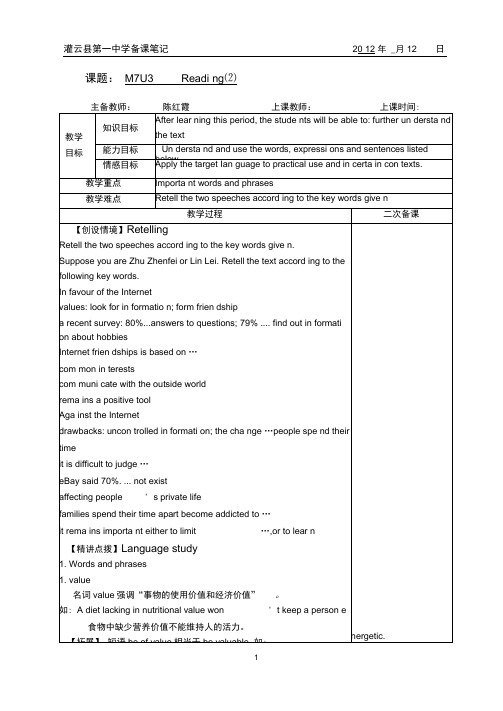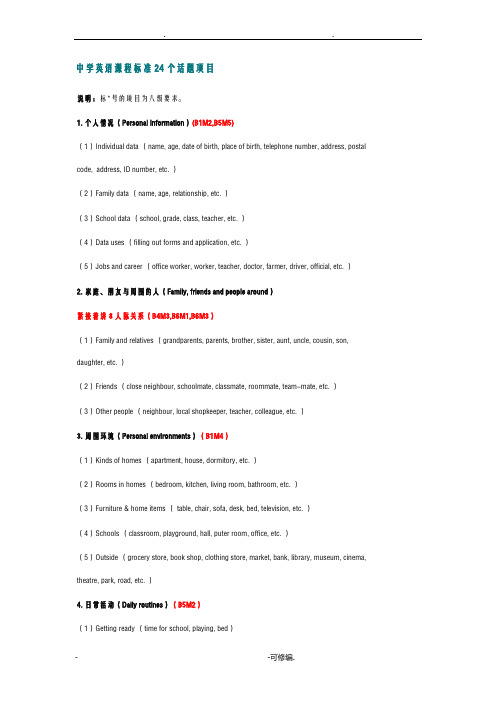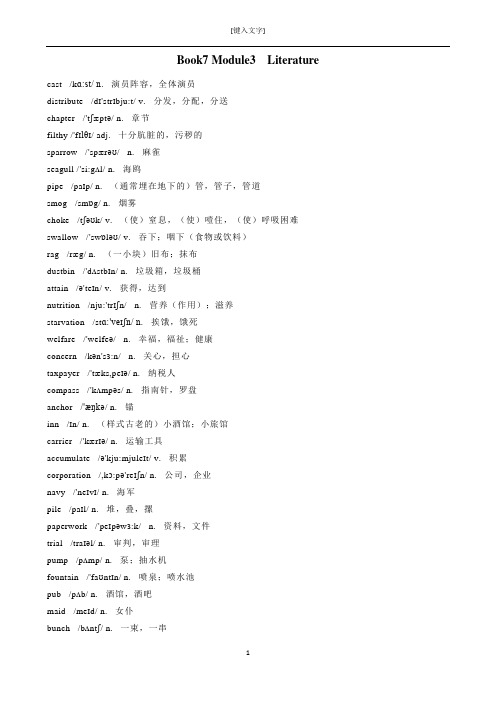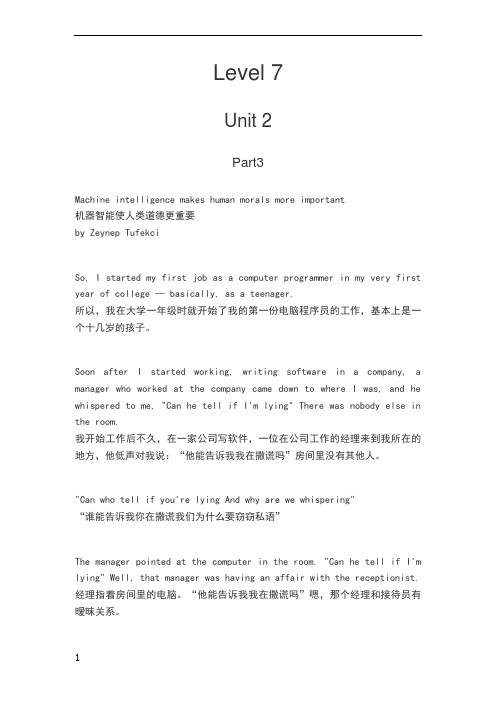B7 M3 reading
(完整版)M7U3Reading(2)

灌云县第一中学备课笔记20 12 年 _月12 日课题:M7U3 Readi ng⑵The diamond necklace is of great value. 这根钻石项链很贵重。
=The diam ond n ecklace is valuable.与之易混淆的名词是worth,它强调“事物的道德、文化、精神方面的内在价值。
女口:The pair of boot is worth more than 1000 yuan.这双靴子价值超过1000元。
作“值得”解时,worth的结构通常为:be worth doing ;而worthy 的结构通常为be worthy to be done,或be worthy of being done。
女口:Lily is worth making friends with. Lily 是个值得交的朋友。
=Lily is worthy to be made friends with.=Lily is worthy of being made friends with.【练习】Differe nt people have differe ntA. valueB. worthyC. worthD. valuable【答案】A2. turn to短语turn to表示向某人、某事物寻求帮助;turn out意为证明为、结果是;turn up 意为出现或把.......... 调大;turndown意为拒绝或把 ......... 调小。
如:(1) The Da Vinci Code turned out to be the bestseller. 达芬奇的密码是畅销书。
(2) Somebody un expected turned up at the party. 没有预料至U的人出现在了聚会上。
(3) There s no doubt that Jane would turn down his proposal毫无疑问,简会拒绝他的求婚。
英语课标的24个话题

中学英语课程标准24个话题项目说明:标*号的项目为八级要求。
1. 个人情况(Personal information)(B1M2,B5M5)(1)Individual data (name, age, date of birth, place of birth, telephone number, address, postal code, address, ID number, etc. )(2)Family data (name, age, relationship, etc. )(3)School data (school, grade, class, teacher, etc. )(4)Data uses (filling out forms and application, etc. )(5)Jobs and career (office worker, worker, teacher, doctor, farmer, driver, official, etc. )2. 家庭、朋友与周围的人(Family, friends and people around)紧接着讲8人际关系(B4M3,B6M1,B6M3)(1)Family and relatives (grandparents, parents, brother, sister, aunt, uncle, cousin, son, daughter, etc. )(2)Friends (close neighbour, schoolmate, classmate, roommate, team-mate, etc. )(3)Other people (neighbour, local shopkeeper, teacher, colleague, etc. )3. 周围环境(Personal environments)(B1M4)(1)Kinds of homes (apartment, house, dormitory, etc. )(2)Rooms in homes (bedroom, kitchen, living room, bathroom, etc. )(3)Furniture & home items ( table, chair, sofa, desk, bed, television, etc. )(4)Schools (classroom, playground, hall, puter room, office, etc. )(5)Outside (grocery store, book shop, clothing store, market, bank, library, museum, cinema, theatre, park, road, etc. )4. 日常活动(Daily routines)(B5M2)(1)Getting ready (time for school, playing, bed)(2)Dressing, brushing teeth, washing hands and face, taking a shower, etc.(3)Eating (breakfast, lunch, snacks and dinner)(4)Daily chores (tidying, sweeping, doing dishes, cooking)(5)Homework (reading, writing, studying, etc. )(6)Family time (watching television, going out, visiting, etc. )5. 学校生活(School life)(B1M1,B1M2,B1M5,B7M2)(1)School building (classroom, office, library, washroom, etc. )(2)School organization (grade, class, subject, break, schedule, etc. )(3)People (teacher, classmate, schoolmate, cleaner, etc. )(4)Subjects (Chinese, maths, English, geography, history, etc. )(5)Activities (sports, extra-curricular involvement, trip, etc. )(6)Instruction (Please listen, read, get into groups, act, etc. )(7)Educational methods (preview, review, discuss, presentation, summary)6. 兴趣与爱好(Interests and hobbies)(1)Less (music, dance, acting, sport, etc. )(2)Games (physical games, puter games, sports, etc. )(3)Hobbies (collecting stamps, coins, dolls, etc. )(4)Reading (books, newspapers, ics, etc. )(5)Cultural events (film, theatre, concert, opera, etc. )(6)Entertainment (listening to radio, watching TV, playing CD, DVD, etc. )(7)Socializing (having parties, issuing invitation, going for piics, going sightseeing, entertaining guests, etc. )(8)Expressing your reaction to these activities7. 个人感情(Emotion)(1)Describing feelings (happy, sad, angry, upset, pleased, proud, lonely, worried, nervous, afraid, etc. )(2)Expressing emotion (smiling, laughing, crying, shouting, etc. )(3)Describing facial expression and gestures8. 人际关系(Interpersonal relationships)见上(1)People (parent, brother, sister, other family members, friend, neighbour, teacher, etc. )(2)Social behaviours (greeting, introducing, giving thanks, asking for permission, asking for help, solving problems, dealing with conflicts, etc. )(3)Getting together (making plans / arrangements, time, date, place, event, etc. )9. 计划与愿望(Plans and intention)(1)Planning (holidays, social events, travel, further education, jobs, etc. )(2)Organizing ( asking for advice, asking for help, asking for permission, exploring possibilities, expressing needs and wants, etc. )10. 节假日活动(Festivals, holidays and celebration)(B5M4)(1)Cultural festivals ( Spring Festivals, New Year's Day, Christmas, etc. )(2)Religious holidays (Christmas, Easter, Ramada, etc. )(3)Personal celebration (birthday, anniversary, graduation, etc. )11. 购物( Shopping)(1)Planning (shopping list, needs, wants, etc. )(2)Products (clothes, groceries, personal items, electronics, etc. )(3)Selecting (quality, weights, measures, size, colour, style, etc. )(4)Paying (price, quantity, etc. )12. 饮食(Food and drink)(B8M3)(1)Meats (beef, chicken, pork, fish, etc. )(2)Soups (chicken, tofu, vegetable, etc. )(3)Vegetables (cabbage, eggplant, etc. )(4)Staple food (rice, bread, noodles, cake)(5)Drinks (milk, water, juice, soft drink, coke, alcoholic drinks, beer, wine, etc. )(6)Fast foods ( sandwiches, noodles, dumplings, hot dogs, hamburgers, chips, etc. )(7)Snacks (ice cream, chips, etc. )(8)Eating customs (ways of eating, kinds of food, times to eat,table manners, chopsticks, knife, fork, etc. )(9)Requesting or offering different foods and drinks(10)Likes and dislikes (favourite food, favourite drinks, etc. )(11)Ordering food and/or drinks13. 健康(Health)(B2M1,B2M2)(1)Eating habits(2)Physical fitness and exercise(3)Personal hygiene(4)Illnesses (stomachache, headache, flu, cold, etc. )(5)Medication(6)Accidents(7)Doctors, nurses & hospitals(8)Describing problems (parts of the body, pains, etc. )(9)Medical insurance14. 天气(Weather)(B3M4)(1)Describing weather (sunny, cloudy, windy, rainy, hot, warm, cold, cool, etc. )(2)Extreme weather (storms, gales, hurricanes, etc. )(3)Dressing for the weather ( coat, hat, umbrella, raincoat, windbreaker, etc. )15. 文娱与体育(Entertainment and sports)(B7M1)(1)Movies and theatre(2)Music and dance (folk music and dance, popular music and classical music)(3)Team games (football, basketball, volleyball, etc. )(4)Games of two or four (table tennis, tennis, golf, etc. )(5)Racing (running, swimming, horse racing, etc. )(6)International sports events ( Olympic Games, World Cup, Football League, etc. )(7)Spectators and fans(8)Physical exercises16. 旅游和交通(Travel and transport)(B1M3,B4M2,B5M5)(1)Methods of transportation ( walking, cycling, horse riding, taking buses, trains, boats, planes)(2)Travel (schedules, maps, tickets, fares)(3)Getting and asking direction(left, right, straight ahead, north, south, east, west, etc. )(4)Safety rules and warnings (traffic lights, caution, walk, stop, etc. )(5)Inquiring and making reservation (hotels, tourist spots, etc, )(6)International travel (passport, visas, expenses, currency, etc. )(7)Describing a journey17. 语言学习(Language learning)(B5M1,B8M4)(1)Differences between American English and British English(2)Language and culture(3)Language learning difficulties(4)Attitudes to language and munication(5)Language learning strategies(6)munication repair18. 自然(Nature)(B3M3,B4M6,B5M6)(1)Plants (green plants, trees, bushes, grass, vegetables, crops, flowers. etc. )(2)Animals (farm animals, wild animals, endangered animals, pets, etc. )(3)Heavenly bodies (The sun, the earth, the moon and stars, etc.)(4)Describing land (cities, farms, hill, mountains, lakes, rivers, etc. )(5)Natural disasters (Volcano,earthquake, etc. )*19. 世界和环境(The world and the environment)(1)Countries and maps (China, Great Britain, United States, Australia, Canada, New Zealand, Japan, Russia, India, Egypt, Cuba. etc. )(2)Issues (pollution, land use and quality, population growth, housing, etc. )20. 科普知识与现代技术(Popular science and modern technology)(B1M5,B1M6,B4M4,B6M5,B8M5)(1)Recent invention, medical advances, technological advances, etc.(2)puter science21. 热点话题(Topical issues)(1)Population *(2)Environmental cervation *(3)Crime and punishment *(4)Social differences *(5)Pollution22. 历史和地理( History and geography)(历史:B3M5,B6M6,B8M2;地理:B3M1,B3M6,B8M1)(1)General knowledge of history and geography about China(2)General knowledge of history and geography about the world(3)Historic events(4)Historical pers23. 社会(Society)(B3M2,B4M1)(1)Nationality and people(2)Famous people (contemporary)(3)Law (rules and regulation, traffic codes)(4)Ways of dressing (types of clothes, daily clothes or dress, situation and dressing)(5)Names of religion *(6)Religion and culture *(7)Customs and culture24. 文学与艺术(Literature and art)(文学:B5M3,B6M2,B7M3,B8M6;艺术:B2M4;音乐:B2M3,B6M4,B7M4)(1)Forms of literature and art (play, drama, novel, essay, poetry, shortstory)(2)Famous literary people and artists *25. 文化与传媒(culture and media)(文化:B3M6,B7M5,B7M6)、(传媒:B2M5,B2M6)整合版:1.个人情况(Personal information)(即人物介绍类)2.家庭、朋友与周围的人(Family, friends and people around)+人际关系(Interpersonal relationships)3.周围的环境(Personal environments)+天气(Weather)+自然(Nature)+世界和环境(The world and the environment)(即包含环境、水资源、野生动物的现状和解决措施,自然灾害的描述)4.日常活动(Daily routines)(即活动描写类,包含日记、通知类)5.学校生活(School life)+兴趣与爱好(Interests and hobbies)+文娱与体育(Entertainment and sports)(即包含寄宿学校的好坏,课外活动,课外辅导、压力、独立性和业余工作)6.节假日活动(Festivals, holidays and celebration)(端午、中秋、元宵、反思西方文化的入侵)7.购物( Shopping)(网上购物,投诉类信件)8.饮食(Food and drink)+健康(Health)(食品安全,危害和措施)9.旅游和交通(Travel and transport)(旅行的好处,醉驾的危害和措施,交通问题和解决措施)10.语言学习(Language learning)(学习方法的介绍,学习困难提出与解决)11. 科普知识与现代技术(Popular science and modern technology)(网络运用,网络安全,微博,个人信息泄露)12. 历史和地理( History and geography)(地点介绍类)13. 看图作文(单图和多图组合)14. 热点话题(Topical issues)(好人好事、道德观念、慈善事业)15. 文化与传媒(culture and media)。
B7 M3 Dickens‘ London(Page 39)

Book7 Module3 Literature cast /kɑ:st/ n. 演员阵容,全体演员distribute /dɪ'strɪbju:t/ v. 分发,分配,分送chapter /'tʃæptə/ n. 章节filthy /'fɪlθɪ/ adj. 十分肮脏的,污秽的sparrow /'spærəʊ/ n. 麻雀seagull /'si:gʌl/ n. 海鸥pipe /paɪp/ n. (通常埋在地下的)管,管子,管道smog /smɒg/ n. 烟雾choke /tʃəʊk/ v. (使)窒息,(使)噎住,(使)呼吸困难swallow /'swɒləʊ/ v. 吞下;咽下(食物或饮料)rag /ræg/ n. (一小块)旧布;抹布dustbin /'dʌstbɪn/ n. 垃圾箱,垃圾桶attain /ə'teɪn/ v. 获得,达到nutrition /nju:'trɪʃn/ n. 营养(作用);滋养starvation /stɑ:'veɪʃn/ n. 挨饿,饿死welfare /'welfeə/ n. 幸福,福祉;健康concern /kən'sɜ:n/ n. 关心,担心taxpayer /'tæks,peɪə/ n. 纳税人compass /'kʌmpəs/ n. 指南针,罗盘anchor /'æŋkə/ n. 锚inn /ɪn/ n. (样式古老的)小酒馆;小旅馆carrier /'kærɪə/ n. 运输工具accumulate /ə'kju:mjuleɪt/ v. 积累corporation /,kɔ:pə'reɪʃn/ n. 公司,企业navy /'neɪvɪ/ n. 海军pile /paɪl/ n. 堆,叠,摞paperwork /'peɪpəwɜ:k/ n. 资料,文件trial /traɪəl/ n. 审判,审理pump /pʌmp/ n. 泵;抽水机fountain /'faʊntɪn/ n. 喷泉;喷水池pub /pʌb/ n. 酒馆,酒吧maid /meɪd/ n. 女仆bunch /bʌntʃ/ n. 一束,一串mistress /'mɪstrɪs/ n. 女主人accomplish /ə'kʌmplɪʃ/ v. 完成(任务等),取得(成功)ambassador /æm'bæsədə/ n. 大使humble /'hʌmbļ/ adj. (身份、地位等)低下的,卑微的pedestrian /pɪ'destrɪən/ n. 行人lantern /læntən / n. 灯笼,提灯mourn /mɔ:n/ v. 悼念,哀悼,为……哀痛a huge amount of 大量的bring sth. to the attention of sb. 使某人关注某事Dickens’ LondonDickens’s cast of characters lived in London, the largest and richest city in the world. But its wealth was distributed unfairly among the population. Every chapter of his novels describes the sights, sounds, and smells of the city, and provides a social commentary of London life.In the middle of the 19th century, London was a filthy city for rich and poor people alike. Although on clear days, the air was filled with sparrows and seagulls flying high above, more often the smoking chimney pipes created smog which was so strong that it choked the inhabitants. The River Thames was polluted, causing disease and death everywhere, and if you fell in, it was dangerous to swallow the water.The East End was London’s poorest district, where children wore rags for clothes andthe women searched in dustbins for food. Few people could ever hope to attain an acceptable standard of living. Many people suffered from the effects of poor nutrition and even starvation because of a lack of food, yet their welfare was of no concern to the taxpayers of London. Ships from all points of the compass would drop anchor here at the main port of London. South of the river lies Southwark, another poor district. The George Inn was a busy coaching stop with food and accommodation for travelers leaving London, and for carriers taking goods into the city.But some Londoners had accumulated enormous wealth through trade. In the old City of London are housed the many banks and corporations which Dickens mentions. Further west and opposite Southwark stands Somerset House, where Dicken’s father worked for the navy.Close by are the law courts, where lawyers and their clerks, carrying piles of paperwork, would hurry to the trials. There were many squares and gardens with water pumps and fountains, as well as smart restaurants and pubs.Servants would buy fruit and vegetables at Covent Garden market for their rich families, and maids would buy bunches of flowers to decorate their mistress’s rooms.The West End is the theatre district where Dickens felt at home because, surprisingly,he thought he would accomplish more with his drama than with his novels. It is also the London of government, where politicians, ministers, ambassadors as well as more humble pedestrians walked home at night through streets lit with gas lanternsLondon is very different today, and few people mourn the passing of the old city. But you can still see many of the sights which Dickens saw and wrote about in his novels.Reading1. distribute wealth unfairly ____________2. be filled _____ = be full ____3. fly high _____________4. create smog _____________5. attain an acceptable standard of living ________6. be of no concern to sb ________7. suffer from the effects of poor nutrition _____________8.from all points of the compass __________ 9.food and accommodation ___________10. busy coaching stop _____________ 11.feel at home _____________12.accumulate enormous wealth through trade _____________13.brunches of flowers _____________ 14.walk through streets lit with gas lanterns _______ Step 2. Reading (P39)Part I. Pre-reading :Look at the title of the passage. Decide what text type the passage isA: a narrative: an account, consisting of or characterized by story-telling.B: a description: an account telling you what somebody or something is like.C: an argument: discussion, a paragraph or a passage in which disagreement is expressed.Part II. While-reading :Activity 1. Read the passage quickly and choose the main idea of the passage. (3 minutes)A. Dickens’ cast of characters lived in London, the largest and richest city in the world.B. Every chapter of his novels describes the sights, sounds and smells of the city, andprovides a social commentary of London life.C. In the middle of the 19th century, London was a filthy city for rich and poor people alike.D. London is very different today, and few people mourn the passing of the old city.Activity 2. Read the passage carefully and finish the following exercises. (10 minutes)1. Few people had a good standard of living because _____A. the taxpayer didn’t care about themB. the city was pollutedC. there were huge numbers of poor peopleD. the wealth was distributed unfairly among the population.2. Poverty was so severe that ________.A. some people were ill because they didn’t have enough to eatB. children wore rags for schoolC. the river became polluted and because disease and deathD. it was dangerous to swallow the water if you fell in the river3. The port of London was where ______.A. the district of the East End and Southwark wereB. the poorest people livedC. men queued for work every dayD. ships came from all over the world to load and unload their goods.4. The old City of London was _____.A. the business and financial district of LondonB. where Dickens livedC. where the Law Courts and many restaurants and squares wereD. Dickens set his stories5. The further west you we nt in Dickens’ London ______.A. the more Dickens felt at homeB. the richer and more important the people who lived there wereC. the safer it was to walk at nightD. the less it looks like London todayPart III. After-reading: Read the passage again and fill the blanks.1. Although ____ clear days the air was filled with sparrows and seagulls ________(fly) high above, more often the _________ (smoke) chimney pipes created smog which was so strong ______ it choked the inhabitants.2. Many people suffered ______ the effects of poor nutirtion and even _________ (starve) because of a lack _____ food, yet their welfare was ____ no concern to the taxpayers of London.3. The George Inn was a busy coaching stop with food and accommodation for travellers ________ (leave) London, and for carriers __________ (take) goods into the city.Language points1. But its wealth was distributed unfairly among the population.distribute (vt) ___________distribute sth. to sb. ___________He prizes the winners.他给获胜者颁了奖。
牛津译林版英语9AUnit7ReadingII教学设计

3.引导学生通过自主阅读、总结、归纳等过程,掌握文章的关键信息和观点,提高自主学习能力。
4.设计多样化的阅读活动,如填空、选择、排序等,让学生在完成任务的过程中,提高阅读技巧和策略。
(三)情感态度与价值观
1.培养学生关注社会问题,增强社会责任感和公民意识,使其认识到平等、公正的重要性。
4.教学过程中,注重引导学生关注文章中的情感态度和价值观。教师可以提出具有启发性的问题,让学生进行思考、讨论,从而培养其社会责任感和公民意识。
5.针对不同阅读能力的学生,实施分层教学。为阅读能力较强的学生提供更具挑战性的任务,激发他们的学习兴趣;为阅读能力较弱的学生提供更多的支持和指导,帮助他们逐步提高阅读能力。
1.教师引导学生回顾本节课所学内容,总结文章的主旨大意、重点词汇和表达方式。
2.学生分享自己在课堂上的收获和感悟,教师给予肯定和鼓励。
3.强调文章中所传递的情感态度和价值观,引导学生关注社会问题,培养其社会责任感和公民意识。
4.布置课后作业,要求学生完成与课堂练习相关的巩固练习,并进行自主学习,深入了解马丁·路德·金和民权运动。
难点:针对不同阅读能力的学生,设计合适的阅读活动,使他们在课堂上得到有效的锻炼和提高。
3.重点:激发学生对社会问题的关注,培养其社会责任感和公民意识。
难点:如何将文章中的情感态度和价值观融入教学过程中,引导学生进行思考和讨论。
(二)教学设想
1.针对词汇和短语的学习,采用课前预习、课堂讲解和课后巩固的方式进行。教师可以利用多媒体课件、实物演示等教学资源,帮助学生形象地理解和记忆词汇。
2.通过学习马丁·路德·金等杰出人物的事迹,激发学生对正义和勇气的崇敬,培养积极向上的价值观。
孩子们(复数)

and conj.和;并且B1M1新增And you?你呢?B1M1apple n.苹果B1M4arm n.手臂B1M2hand n.手B1M2Mrs n.夫人;太太B1M1OK adv.好;行B1M1ten num.十B1M6that pron.那B1M2these pron.这些B1M6very adv.非常B1M6cake n.糕;饼;蛋糕B1M4like vt.喜欢B1M4nine num.九B1M6bird n.鸟B1M5bus n.公共汽车B1M5*am v.是B1M1*and conj.和;同;又;并且B1M1*brother n.兄弟B1M1*class n.班;全班同学B1M1*hello int.喂;你好B1M1*hi int.喂;你好B1M1*I pron.我B1M1*I'm=I am我是B1M1*is v.是B1M1*meet vt.遇见;会面B1M1*miss n.小姐B1M1*Mr n.先生B1M1*my pron.我的B1M1*name n.名字B1M1*name's=name is名叫……B1M1*new adj.新的B1M1新增 *nice adj.好的B1M1*Nice to meet you.见到你很高兴。
B1M1*teacher n.老师B1M1*this pron.这B1M1*to prep.给,向B1M1新增 *too adv.也B1M1*what's = what is*you pron.你B1M1*your pron.你的B1M1▲morning n.早上B1M1▲about prep.关于B1M5▲alien n.外星人B1M5▲down n.向下B1M5▲Hurray!int乌拉!万岁!太好啊!B1M5 ▲lend v.借给B1M3▲motorbike n.摩托车B1M5▲oh int.哦;啊B1M3▲page n.页B1M5▲sit vi.坐B1M5▲Sit down.坐下。
b7m3 Vocabulary

cruelly 残忍的,残酷的 2.cruel adj. ____________ adv. ______ be kind to 对….残忍/残酷 be cruel to _____________→←___________ be cruel to Don’t ____________ animals. (不要虐待动物). They are our fellow creatures. It is cruel of ____ ____ ____ ____ him to beat his boy like that. 他那样打孩子很残忍。
低声地说; 耳语 7.whisper v. _________ __________ 把某事悄悄告诉某人 whisper sth to sb ________________ low 低声地 in a whisper=in a________voice__________
desperation 绝望的 8.desperate adj._________ n._________ desperately adv._________
喂养 为…提供食物 3.feed v. ______ ______ fed fed feed-- ____(过去式)--____ (过去分词)
(人)以……为食 (动物)以……为食 feed on _______________live on_____________ feed sb. with/on sth feed sth to sb = ________________ 感到厌倦 be fed up with _______________ am fed up with (1)I ______________ your excuse!(听够了) (2)Cows ________ hay in winter. feed on feeds (3)He ________ the baby every 4 hours.
英语流利说level7-u2-p3文本

Level 7Unit 2Part3Machine intelligence makes human morals more important机器智能使人类道德更重要by Zeynep TufekciSo, I started my first job as a computer programmer in my very first year of college -- basically, as a teenager.所以,我在大学一年级时就开始了我的第一份电脑程序员的工作,基本上是一个十几岁的孩子。
Soon after I started working, writing software in a company, a manager who worked at the company came down to where I was, and he whispered to me, "Can he tell if I'm lying" There was nobody else in the room.我开始工作后不久,在一家公司写软件,一位在公司工作的经理来到我所在的地方,他低声对我说:“他能告诉我我在撒谎吗”房间里没有其他人。
"Can who tell if you're lying And why are we whispering"“谁能告诉我你在撒谎我们为什么要窃窃私语”The manager pointed at the computer in the room. "Can he tell if I'm lying" Well, that manager was having an affair with the receptionist.经理指着房间里的电脑。
“他能告诉我我在撒谎吗”嗯,那个经理和接待员有暧昧关系。
英语M3作文

英语M3作文In the 21st century, technology has become an integral partof our daily lives, transforming the way we work, communicate, and learn. The field of education, in particular, has been significantly impacted by technological advancements. This essay will explore the various ways in which technology has influenced modern education, focusing on both its advantages and challenges.Firstly, the advent of the internet has revolutionized the accessibility of information. Students today have access to a wealth of knowledge at their fingertips, which was unimaginable a few decades ago. Online resources such as educational websites, e-books, and digital libraries have made it easier for students to conduct research and expandtheir understanding of various subjects.Secondly, technology has facilitated more interactive and engaging learning experiences. With the help of multimedia tools, educators can now create dynamic lessons that incorporate video, audio, and interactive content. This not only makes learning more enjoyable but also caters todifferent learning styles, helping students to better grasp complex concepts.Moreover, the use of technology in education has also led to the development of online learning platforms and Massive Open Online Courses (MOOCs). These platforms allow students fromall over the world to access high-quality education withoutthe constraints of geographical location or financial limitations. This has democratized education to a certain extent, providing opportunities for lifelong learning to a broader audience.However, the integration of technology in education is not without its challenges. One of the primary concerns is the digital divide, where unequal access to technology can exacerbate existing educational inequalities. Students from underprivileged backgrounds may not have the same access to technological resources as their more affluent peers, which can hinder their learning opportunities.Additionally, there is the issue of information overload. The abundance of information available online can be overwhelming for students, making it difficult for them to discerncredible sources from unreliable ones. This requires a newset of skills, such as critical thinking and digital literacy, which must be taught alongside traditional academic subjects.In conclusion, technology has brought about significant changes in the landscape of modern education. While it has opened up new avenues for learning and made education more accessible, it also presents challenges that need to be addressed. It is crucial for educational institutions and policymakers to work together to ensure that the benefits of technology are harnessed effectively while mitigating its potential drawbacks. The future of education will undoubtedly continue to evolve with technology, and it is our collectiveresponsibility to navigate this transformation in a way that serves the needs of all learners.。
- 1、下载文档前请自行甄别文档内容的完整性,平台不提供额外的编辑、内容补充、找答案等附加服务。
- 2、"仅部分预览"的文档,不可在线预览部分如存在完整性等问题,可反馈申请退款(可完整预览的文档不适用该条件!)。
- 3、如文档侵犯您的权益,请联系客服反馈,我们会尽快为您处理(人工客服工作时间:9:00-18:30)。
祷……
Video Time
Match the definitions with the correct words 1. a child whose parents are dead 2. a Victorian home for poor people 3. to happen 4. to be extremely hungry and weak 5. a very long story 6. a person who writes novels
Homework
1. Review the new words. 2. Learn more about Charles Dickens and his works. 3. Preview the reading passage on page 30-31.
Read and answer. 1. What experiences from his own life did Dickens use in his novels? 2. What new information have you learnt about Oliver Twist? 3. How did Dickens' novels help to improve English society?
一天, 一天,奥利弗和阿特福等人 一起上街, 一起上街,阿特福行窃时意外败 露,混乱中,奥利弗被人当作小 混乱中, 偷抓进了警局。 偷抓进了警局。幸亏一位书店老 板证明了奥利弗的无辜, 板证明了奥利弗的无辜,而被偷 的富翁布朗罗也心生爱怜, 的富翁布朗罗也心生爱怜,于是 将奥利弗接到了e 3
Literature
About English Literature
English literature is produced in England, from the introduction of old English by the Anglo-Saxons in the 5th century to the present. The works of those Irish and Scottish authors who are closely identified with English life and letters are also considered part of English literature.
万般无奈下, 万般无奈下,他们决定抽 签选定提出加粥的人选, 签选定提出加粥的人选, 结果抽中的正是奥利弗。 结果抽中的正是奥利弗。 晚餐时, 晚餐时,奥利弗如实提出 了要求, 了要求,大惊失色的管事 决定撵走这个造反的隐患。 决定撵走这个造反的隐患。
不过幸运的是, 不过幸运的是,奥利弗终于没 能成为打扫烟囱的小工, 能成为打扫烟囱的小工,而是被殡 仪馆老板索尔比利相中, 仪馆老板索尔比利相中,成了他用 五英镑买来的学徒。 五英镑买来的学徒。循规蹈矩的奥 利弗很快得到老板夫妇的器重, 利弗很快得到老板夫妇的器重,却 也遭到了年长学徒诺尔的嫉妒。 也遭到了年长学徒诺尔的嫉妒。诺 尔取笑奥利弗死去的母亲, 尔取笑奥利弗死去的母亲,奥利弗 忍无可忍大打出手, 忍无可忍大打出手,后来却被老板 误解,遭到毒打。一气之下, 误解,遭到毒打。一气之下,奥利 弗含恨出走,奔向远方的雾都伦敦。 弗含恨出走,奔向远方的雾都伦敦。
Which of the following books have you read?
Who is the writer?
David Copperfield
A Tale of Two Cities
Great Expectations
Oliver Twist
Charles Dickens
雾都孤儿 Oliver Twist
费金和同伙西克并未善罢甘休, 费金和同伙西克并未善罢甘休, 趁奥利弗外出买书之际将其绑架, 趁奥利弗外出买书之际将其绑架,而 布朗罗则误以为小男孩携款潜逃, 布朗罗则误以为小男孩携款潜逃,心 中失望不已。 中失望不已。又回到贼巢的的奥利弗 在费金的哄骗下道出了布朗罗家的境 并被西克胁迫前去抢劫。 况,并被西克胁迫前去抢劫。虽然抢 劫被成功阻止, 劫被成功阻止,但奥利弗却被冷枪击 正当西克准备将他抛进河中之际, 中,正当西克准备将他抛进河中之际, 同行的托比救下了奥利弗。 同行的托比救下了奥利弗。
a) novelist b) take place c) orphan d) workhouse e) novel f) starve
Cultural Corner
Charles Dickens
查尔斯-狄更斯 查尔斯 狄更斯(1812-1870), 狄更斯 , 英国著名小说家。 英国著名小说家。著有 奥列佛-特维斯特 又译 特维斯特》 《奥列佛 特维斯特》(又译 雾都孤儿》 《雾都孤儿》,1838 )、 、 老古玩店》 《老古玩店》(1841)、《大 、 科波菲尔》 卫-科波菲尔》(1850)、 科波菲尔 、 双城记》 《双城记》(1859)和《远大 和 前程》 等等。 前程》(1861)等等。 等等
奥利弗9岁时, 奥利弗9岁时,由于没人供养 他上学读书,于是进了济贫院的 他上学读书, 童工作坊, 童工作坊,每天从事繁重的体力 劳动。 劳动。因为奥利弗既不会耍滑偷 也不会阿谀奉承, 懒,也不会阿谀奉承,所以经常 受到管事的打骂。 受到管事的打骂。这些正在发育 的孩子们终日衣不遮体、食不裹 的孩子们终日衣不遮体、 腹。
故事发生在19世纪30年代的英 故事发生在19世纪30年代的英 19世纪30 在一个寒风料峭的深夜, 国,在一个寒风料峭的深夜, 一个男婴刚在贫民区里呱呱坠 苦命的母亲便撒手人寰。 地,苦命的母亲便撒手人寰。 谁也不知道产妇的身份, 谁也不知道产妇的身份,男婴 由此成了无名孤儿。 由此成了无名孤儿。后来他被 当地教会收养, 当地教会收养,抚养他的女管 事给他起名奥利弗.忒斯特。 事给他起名奥利弗.忒斯特。
险恶叵测的西克依然鼓 动费金除掉奥利弗以绝后患, 动费金除掉奥利弗以绝后患, 而他的女友南茜则试图保护 奥利弗, 奥利弗,并和布朗罗取得联 系,希望帮无辜的奥利弗逃 出魔窟。孰料, 出魔窟。孰料,南茜的意图 已被费金察觉, 已被费金察觉,不久便被西 克残忍的杀害。 克残忍的杀害。
警方很快对西克和费金展 开抓捕,逃跑中,西克不慎丧命, 开抓捕,逃跑中,西克不慎丧命, 费金最终被绳之以法。 费金最终被绳之以法。 不久, 不久,布朗罗带着奥利弗 探望狱中的费金, 探望狱中的费金,尽管经历了种 种费金造就的不幸, 种费金造就的不幸,而善良的奥 利弗却仍在心底默默为他祈
1. His own father was in prison and he worked in a factory as a child; he was also very poor. 2. (Answer is open). 3. They made people aware of child poverty and made them want to do something about it.
Life Story of Charles Dickens
有人说英国女王维多利亚最爱的作家是他, 有人说英国女王维多利亚最爱的作家是他, 有人说英国文学史上唯一能和莎翁抗衡的 人是他, 人是他,更有人说生活经历与作品中的人 物一样跌宕起伏的人是他…… 物一样跌宕起伏的人是他
• What else do you know about Charles Dickens? • Could you name more of the novels he wrote? Oliver Twist 雾都孤儿 Great Expectations 远大前程 A Tale of Two Cities 双城记 David Copperfield 大卫.科波菲尔 A Christmas Carol 圣诞颂歌
在伦敦郊区, 在伦敦郊区,饥寒交迫的奥 利弗遇到了阿特福, 利弗遇到了阿特福,阿特福不仅 为他提供了栖身之处,还将他引 为他提供了栖身之处, 荐给一个叫费金的人。 荐给一个叫费金的人。天真无邪 的奥利弗还蒙在鼓里, 的奥利弗还蒙在鼓里,他住的地 方其实是个贼窝, 方其实是个贼窝,这些孩子都被 当作犯罪工具, 当作犯罪工具,而费金正是他们 教父” 的“教父”。
